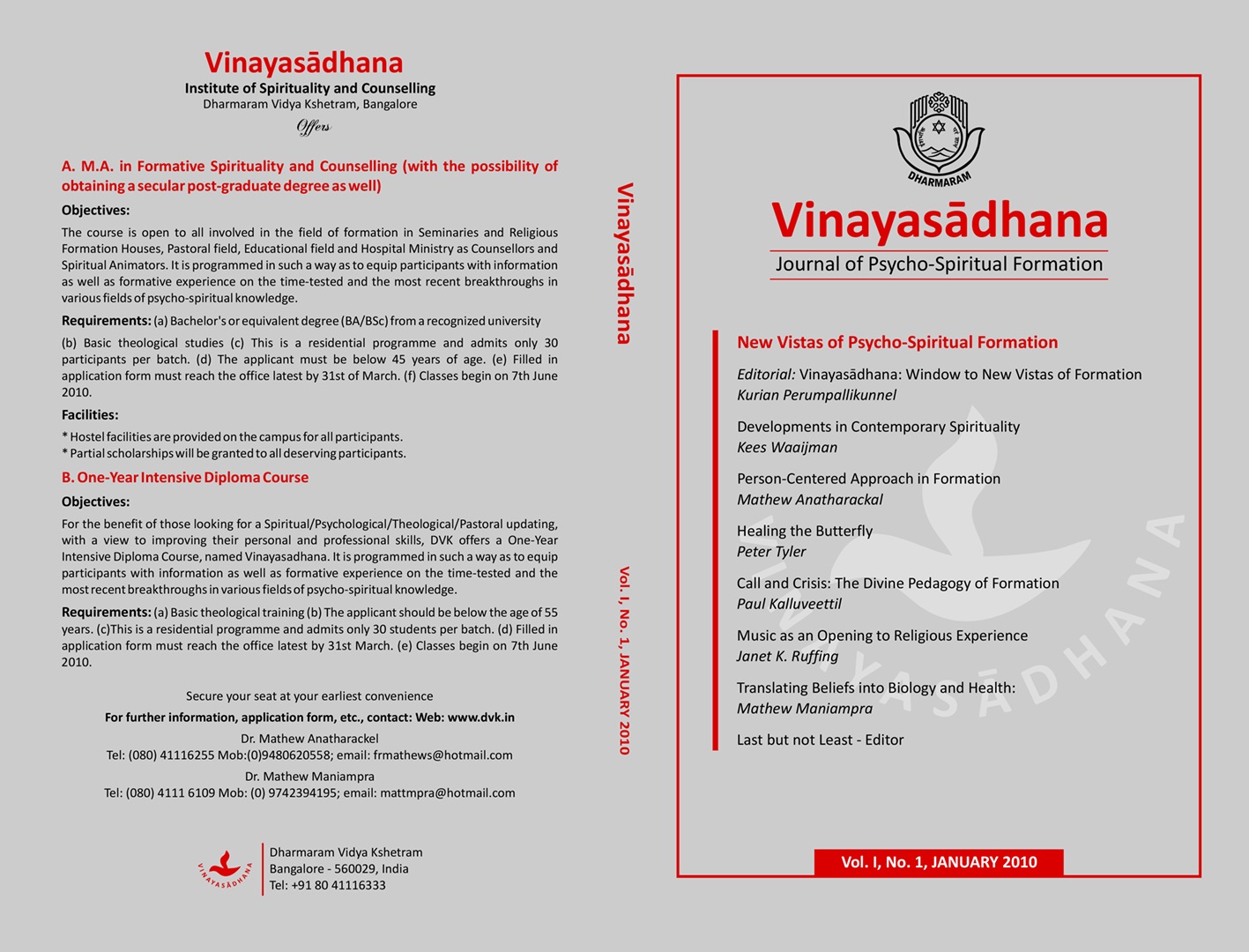Healing the Butterfly
Reflections on the Relationship between Psychotherapy/Counselling and Christian Spiritual Direction
Keywords:
Spiritual direction, counselling and psychotherapy, voluntary involmvement, generous fashionAbstract
Spiritual direction, counselling and psychotherapy are all concerned in creating a helping relationship which has at its heart the facilitation of growth and transformation of the client/directee/pilgrim. It is a workout led by the client, while the therapist/counsellor/director interprets or comments upon material that the client brings to the relationship. It is a voluntary involmvement with a sense of trust between the two, creating a ‘safe space’ in which material is explored in a gentle and generous fashion. Christian spiritual direction presupposes a whole hinterland of faith development, prayer and the ecclesia that is not necessary for psychotherapy. Just as Christians need to be cautious in adopting too easily the tropes and forms of psychology, so psychologists too must be cautious about how they tread on the sacred ground of the spiritual.
References
Brueggemann, W. (2001). The Prophetic Imagination. Minneapolis: Fortress.
Cassian, J. (1997). The Conferences trans B Ramsey. New York: Newman.
Dychtwald, K. (1986). Bodymind. New York: St Martin’s Press.
Fowler, J. (1996). Faithful Change. Nashville: Abingdon.
Francis, L.J. (2005). Faith and Psychology. London: Darton, Longman and Todd.
Freud, S. (1991). ‘Introductory Lectures on Psychoanalysis’ trans. Strachey in Penguin Freud. Vol 1. London: Penguin.
Freud, S. (1991) ‘The Unconscious’, reprinted in Penguin Freud. Vol 11. London: Penguin.
Fuller, A. (1994). Psychology and Religion. Maryland: Littlefield Adams.
Hausherr, (1990). Spiritual Direction in the Early Christian East. Kalamazoo: Cistercian Publications.
Loyola, I. (1980). The Spiritual Exercises of St Ignatius: A Literal Translation and a Contemporary Reading. ed. Fleming, D. Saint Louis: The Institute of Jesuit Sources.
Jacobs, M. (1999). The Presenting Past. Buckingham: The Open University Press.
Jung, C. (1953). ‘The Stages of Life’ in ‘Collected Works’ Vol 8 ‘The Structure and Dynamic of the Psyche’ trans Hull. London: Routledge.
Leech, K. (2001). Soul Friend. Harrisburg: Morehouse Publishing.
Lonsdale, D. (1992). Dance to the Music of the Spirit. London: DLT.
McGinn, C. (2004). ‘Can we solve the mind-body problem?’ Mind 98 (1989) reprinted in Philosophy of Mind: A Guide and Anthology ed J. Heil, Oxford: OUP.
McIntosh, M. (1994). Mystical Theology. Oxford: Blackwell.
Schermer, V.L., (2003). Spirit and Psyche. London: Jessica Kingsley.
Tacey, D. (2003). ‘Rising Waters of the Spirit’ in ‘Studies in Spirituality’ 13/2003.
Teresa of Avila (1980). The Interior Castle in The Collected Works of St Teresa of Avila. Trans. Kavanaugh and Rodriguez. Washington:ICS.
Tyler, P.M. (1997). The Way of Ecstasy: Praying with Teresa of Avila. Norwich: The Canterbury Press.
Tyler P. M. (2005). ‘The Triple Way’ in The New SCM Dictionary of Christian Spirituality. ed P. Sheldrake. London: SCM.
Tyler, P.M. (2007). ‘Divine Unknowing: Lessons from the Christian Mystical Tradition for Healthcare Today’ in Spirituality and Health International 8:2
Ulanov, A. (2000). The Wisdom of the Psyche. Canada: Daimon.
Winnicott, D. (1979). ‘The Maturational processes and the Facilitating Environment.’ London: Hogarth.


